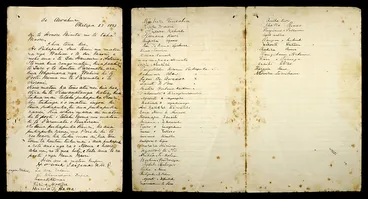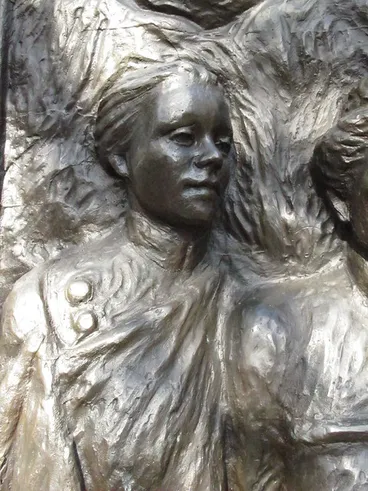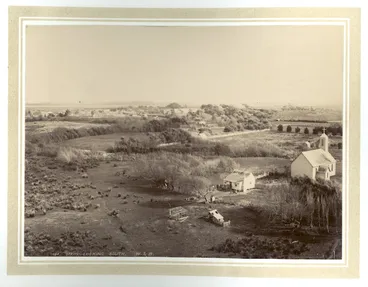Wāhine Māori and the right to vote
A DigitalNZ Story by Janice
Images and articles on wāhine Māori and the suffrage movement.
Pre colonialial New Zealand
Māori women traditionally had a say in the affairs of the tribe, and could inherit land. However, European settlers often preferred to deal with men. Only 13 women signed the Treaty of Waitangi. Māori women continued to fight for land rights, and for the vote for women.
Source: Rawinia Higgins rāua ko Paul Meredith, 'Te mana o te wāhine – Māori women', Te Ara - the Encyclopedia of New Zealand, http://www.TeAra.govt.nz/en/te-mana-o-te-wahine-maori-women (accessed 19 July 2019)
Wāhine Māori included
The Electoral Act of 1983 gave all women in New Zealand the right to vote - this included wāhine Māori.
Application from Māori women to have their names on electoral roll, 1893
Archives New Zealand Te Rua Mahara o te Kāwanatanga
Māori voters at Rotorua, about 1908
Manatū Taonga, the Ministry for Culture and Heritage
Meri Te Tai Mangakāhia (1868–1920)
Te Rarawa, Ngāti Te Teinga, Ngāti Manawa, Te Kaitutae.
Meri Te Tai Mangakāhia was a prominent and influential Māori woman activist in the 1890s. She was well-educated and married to Hāmiora Mangakāhia, the first Premier of the Kotahitanga Māori parliament which first met in 1892. Meri made the most of her connections and social position to advance women’s rights. In 1893 she was involved in establishing Ngā Kōmiti Wāhine, committees associated with the Kotahitanga parliament. These addressed issues confronting Māori women and their whānau. Domestic violence, smoking, alcoholism, religion, single mothers and the retention of traditional skills were all on the agenda. [1]
One of Meri’s most notorious acts was to present a motion at a Kotahitanga meeting in Hawke’s Bay requesting that women vote and participate in the selection of members. She personally addressed the parliament on the motion – the first woman known to have done so.
Source: 'Meri Mangakāhia', URL: https://nzhistory.govt.nz/media/photo/so-that-women-can-get-the-vote, (Ministry for Culture and Heritage), updated 13-Sep-2018 (accessed 19 July 2019)
Unsung heroes of New Zealand's suffrage movement
Radio New Zealand
Meri Te Tai honoured on Suffrage Day
Radio New Zealand
Meri Te Tai Mangakahia - Kate Sheppard National Memorial
Christchurch City Libraries
Iriaka Matiu Rātana
Iriaka Rātana, the first Māori woman to become a member of Parliament, represented the enormous Western Maori electorate from 1949 to 1969.
Source: Anne Else, 'Gender inequalities - Politics and citizenship', Te Ara - the Encyclopedia of New Zealand, http://www.TeAra.govt.nz/en/photograph/28636/first-maori-woman-mp (accessed 19 July 2019)
First Māori female MPs memorialised
Radio New Zealand
POLITICAL - (Te Ao Hou - No. 30 March 1960)
Alexander Turnbull Library
Wāhine Māori who signed the 1893 Suffrage Petition
Suffragist: Matilda Ngapua
Manatū Taonga, the Ministry for Culture and Heritage
Suffragist: Mary Cross
Manatū Taonga, the Ministry for Culture and Heritage
Suffragist: Mrs M. Rangiora
Manatū Taonga, the Ministry for Culture and Heritage
Suffragist: Jane Driver
Manatū Taonga, the Ministry for Culture and Heritage
Suffragist: Sarah West
Manatū Taonga, the Ministry for Culture and Heritage
Suffragist: R F Orbell
Manatū Taonga, the Ministry for Culture and Heritage
Mr Wi Pere's thoughts about women in Parliament.
A MAORI MEMBER ON WOMEN'S SUFFRAGE. (Nelson Evening Mail, 13 May 1887)
National Library of New Zealand
In honour of wāhine Māori and the vote.
Māori wāhine remembered in women's suffrage movement
Radio New Zealand
Ana Tapiata promotes the role of Māori women in the suffrage movement.
He Rourou for 22 September 2010
Radio New Zealand
When Piwakawa Fly - a play about a Hokiangā-born Māori sugragette.
Same Same but Different - Sandi Hall
Radio New Zealand







